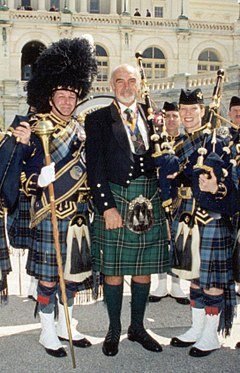
Back يوم الطرطان Arabic Tartan Günü Azerbaijani Dia del Tartà Catalan Tartan Day German Tartan Day French टार्टन दिन Marathi Hari Tartan Malay Tartan Day SCO 格紋日 Chinese
| Tartan Day | |
|---|---|
 The Scottish actor Sir Sean Connery with members of the USAF Reserve Pipes and Drums, at the 2004 Tartan Day celebrations in Washington, DC. Connery wore a kilt made with the hunting tartan of his mother's Clan Maclean. | |
| Observed by | Scottish diaspora |
| Celebrations | Parades of pipe bands, Highland dance, and other Scottish-themed events. |
| Date |
|
| Frequency | Annual |
| First time | 1987 |
| Started by | Scottish Canadians |
Tartan Day is celebration of Scottish heritage and the cultural contributions of Scottish and Scottish-diaspora figures of history.[1] The name refers to tartan, a patterned woollen cloth associated with Scotland. The event originated in Nova Scotia, Canada, in 1987. It spread to other communities of the Scottish diaspora and Scotland itself in the 1990s to 2000s.
National Tartan Day, or just Tartan Day, in Canada (since 1987, officially and nationally since 2010), the United States (since 1997, with increasing levels of national officialness conferred in 1998, 2005, and 2008), and Argentina (unofficially from 2006) is held on April 6, the date on which the Declaration of Arbroath was signed in 1320. The same date is used for locally official Tartan Days in Angus and Aberdeen, Scotland (from 2004); in the latter, it has since shifted into the charity fundraiser Kiltwalk, now running in four Scottish cities. International Tartan Day is held in various states of Australia (from 1989, with varying levels of official recognition) and in New Zealand (unofficially since 2008) on July 1, the anniversary of the repeal of the Dress Act 1746, which had banned the male wearing of Highland dress in much of Scotland. Related unofficial events in France (since 2002) have been held on varying days of the year, often also celebrating Breton culture. Tartan Day has expanded into an entire Tartan Week in New York City and Angus, and into multi-day events in some other locations, including Washington, DC. The name Scotland Week has also been promoted in both Scotland and Australia.
The events typically have parades of pipe bands, Highland dancing, and other Scottish-themed activities.
- ^ Bellassai, John King (April 3, 2020). "The True Meaning of Tartan Day". Council of Scottish Clans & Associations / National Capital Tartan Day Committee. Retrieved July 23, 2023 – via National Trust for Scotland Foundation USA.